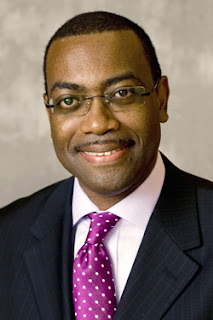 |
| Akinwumi Adesina |
Written by the Editorial Board of The Guardian Newspaper
It is an irresistible financial help the President of African Development Bank (AfBD), Dr. Akinwumi Adesina, offered the other day in the form of USD10.00 billion the bank is making available to the government of Nigeria for development purposes. The fund, which will be made available within the period, 2016 to 2019 would be used for improvement in the areas of agriculture, infrastructure, electricity, small and medium enterprises, women and youth inclusion. The Bank of Industry (BOI) would be assisted with USD100 billion for onward-lending to small and medium enterprises at low interest rates while Development Bank of Nigeria (DBN) would be provided USD5 billion for investment in the real sector of the Nigerian economy. The report confirmed that part of the fund from AfDB would also be used to reform the Bank of Agriculture (BOA) to position it to be able to attract funds for its operations. However, for the current year 2016, AfDB would provide Nigeria with USD1.00 billion “budget support” finance which will assist the government in financing the 2016 budget deficit. It will therefore, address the budget imbalance and assist in bringing about macro-economic stability in the country.
To ensure that the money serves its intended purpose successfully, the AfDB rightly demanded that the government should ensure proper synergy between the fiscal and monetary policies. The importance of synergy between monetary and fiscal policies is in the fact that both policies will not work at cross-purposes and thus serve to achieve the desired stability in the macro-economy and eventual growth and development.
There is hardly any doubt that it is a welcome development that AfDB is availing the country the financial life-line at a time the country is facing drastic decline in its revenue earning capacity, expenditure is trending higher and economic recession has occupied the environment. The AfDB deserves to be commended for not only recognizing the unique position of its largest shareholder, Nigeria but coming to its assistance at the moment of its travails.
There are several reasons the country must appreciate the availability of the AFDB funding. Perhaps, the most important is that the money will assist government to meet some of its obligations under the 2016 budget without further excuses. When this happens, Nigerians will equally be able to fend for themselves without agonizing too much about the rampaging recession and associated inflation. The second is that the credit facility has, according to reports, a low interest rate of just 1.2 per cent per annum. This means that the service cost will be affordable. Third, the intended purposes have been made public, thus providing the citizens the opportunity to monitor deployment of the funds.
Given the foregoing, it is important to emphasize that government must avoid diversion of the money into unintended purposes and uses. The right thing for government to do is to deploy the money to clearly prior identified critical need areas that promise quick turn-around for positive impacts on the socio-economic well-being of the people. To achieve this, government bureaucracy must be disarmed. This is even moreso given, that the financial year is less than three full months to end. There is also the need for the government not only to commence sensitisation and enlightenment of the public on the roles they are expected to play under the current dispensation but also to lead such propagations by credible examples.
It is imperative for the government and people of Nigeria not to forget that AfDB is neither a Father Christmas nor a Good Samaritan. Any availed financial facility to the country must be repaid with interest. Thus, government must not just be excited at availability and utilization of the credit facility but must also be concerned about how to raise money to pay back when the facility is due. This, it is expected to do without jeopardizing the economy. In this wise, while borrowing at this point of the country’s dire need of funds to cover serious revenue shortfalls is the right thing to do, the other side of the coin is making sure that the borrowed fund is paid back in line with agreed terms and conditions. Anything short of this will ruin the country’s credit worthiness with grave consequences. Indeed, non-repayment of any portion of the credit facility will throw a big obstacle at Nigeria’s ability to access the balance promised by the bank in the upcoming years of 2017 to 2019.
A serious government which has multiple daunting challenges like Nigeria must be disciplined in the management of available resources. Thus, it will be evidence of good governance if the government of President Muhammadu Buhari ensures effective monitoring and supervision of the use to which the money would be put. There is also the need for an independent mechanism that will, on sustained basis, assess and evaluate this. For transparency’s sake, the government should periodically inform the Nigerian people of the areas to which the funds had been deployed, the progress made and its overall impact.
(adsbygoogle = window.adsbygoogle || []).push({});

